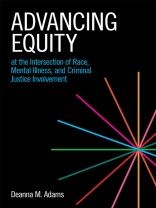This book is designed for every attorney who handles criminal cases, regardless of experience with cases involving people who have mental illness or with social justice topics. The concepts in the book are deep enough to provide new insights to those well versed in topics covered, while simple enough that novices can walk away with immediately usable techniques and a conceptual framework for incorporating equitable lawyering into their practice. Finally, a list of tools and resources follows each chapter to support further learning and to address cases at hand. Following the theme of equity, all tools and resources listed are accessible to all attorneys, regardless of financial and resources availability.
Table of Contents
Part I: Foundations
Part II: How Criminal Justice Professionals Can Help Advance Equity
Part III: Equity on Both Sides of the Adversarial System
Part IV: Advancing Equity Across the Criminal Justice Continuum
Part V: Moving from Theory to Action
关于作者
Deanna Adams supervises the Behavioral Health and Collaborative Justice Unit within the Criminal Justice Services department of the Judicial Council of California, the policymaking body of California’s judicial branch. She oversees staff and projects focused on collaborative courts, mental health diversion, competency to stand trial, and other areas related to behavioral health needs of people moving through adult criminal courts. Prior to this role, she was with the Council of State Governments Justice Center, the Chief Probation Officers of California, and worked directly with people moving through the justice system. Deanna is appointed to the City of Sacramento Ethics Commission, sits on the Board of Directors for the Forensic Mental Health Association of California, and is vice chair of the ABA Criminal Justice Section’s Alternatives to Incarceration and Diversion Committee. She currently lives in Sacramento, California.












